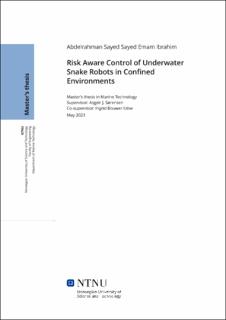| dc.description.abstract | The growing interest in ocean discovery imposes a need for inspection and intervention in confined and demanding environments. To tackle these demanding environments, articulated underwater robots, such as Eely, with their slender shape and adaptable body configurations, have emerged as a viable solution. However, operating Eely in such environments presents a set of complex challenges. It must navigate through uncertain and unstructured surroundings, withstand extreme environmental conditions, and overcome limited navigational capabilities.
This thesis addresses these challenges by proposing a Bayesian approach to assess the risks associated with the loss of Eely during mission scenarios. The primary goal of this thesis is to enhance Eely’s performance and increase the likelihood of mission success. In addition, an altitude controller based on a nonlinear Fractional Order PID (FOPID) controller is proposed. This controller aims to regulate and stabilize the altitude of Eely underwater snake robot.
Through simulations, the proposed controller is thoroughly evaluated to demonstrate its robustness and effectiveness in controlling the altitude of Eely. The simulations provide valuable insights into the controller’s performance in diverse underwater conditions, including scenarios with uncertain and unstructured environments. By leveraging the benefits of the FOPID controller, Eely showed improved altitude regulation capabilities, enabling it to navigate through challenging terrains with enhanced precision and stability. The simulation results are compared to the results obtained from field experiments in which similar tests are conducted.
Moreover, the Bayesian risk assessment approach serves as a valuable tool in quantifying the potential risks and uncertainties associated with Eely’s missions. By assessing and mitigating these risks, the proposed approach contributes to increasing the overall reliability and safety of Eely’s operations in demanding underwater environments.
In short, this thesis presents a comprehensive study focused on the challenges faced by Eely in confined and demanding underwater environments. By combining a Bayesian risk assessment methodology with a sophisticated FOPID altitude controller, this research aims to improve Eely’s performance, enhance mission success rates, and ensure the successful exploration and intervention in sophisticated underwater landscapes. The findings and insights obtained from this study have significant implications for the future development and deployment of underwater snake robots in challenging environments. | |
